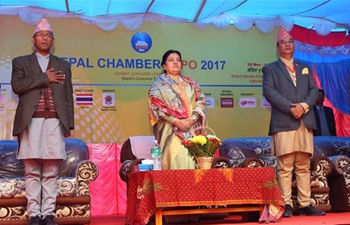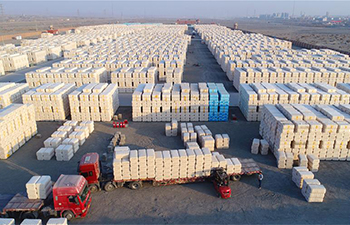MONTEVIDEO, Nov. 30 (Xinhua) -- The Uruguayan business conference of China and Latin American and Caribbean (LAC) countries will throw light on the changes in the Chinese economy, helping improve trade and other ties between the three sides, an Uruguayan academic said.
Latin America lacks defined subregional strategies, especially on how to improve ties with China, said Ignacio Bartesaghi, dean of the faculty of business science at the Catholic University of Uruguay.
The China-LAC 2017 Business Summit, to be held in Uruguayan resort Punta del Este from Nov. 30 to Dec. 2, can help map out such strategies by providing information on the changes the Chinese economy is undergoing, its impact, and how Latin America can benefit from it.
Bartesaghi is also one of the speakers at the second plenary session of the summit on Dec. 1, themed "Infrastructure development and cooperation between China and Latin America and the Caribbean."
Summit participants will explore whether the Chinese pattern of investing in Latin America will change, as well as learn about the importance of business partnerships with China, he told Xinhua.
NEW PARADIGM
The academic is expecting the summit to help replace outdated thinking with a more realistic and dynamic vision of transregional ties.
"These kinds of summits provide us with the reality of the changes taking place in China and how we can position ourselves to be able to stop thinking of China as (just a country that) buys our primary products and...sells us electronic goods," he said. "That's where the central discussion is going to be ...to learn a little more about each other, both in business and government."
Bartesaghi said Uruguay is trying "to make a difference" by crafting a free trade agreement (FTA) with China, because closing an FTA with China implies much more than the deal itself, leading to deepening cooperation in strategic terms.
Bartesaghi said China is also interested in Uruguay as a prior step to entering the regional market.
Besides, closer ties with China and its Belt and Road Initiative could indirectly benefit Latin America, he said.
The initiative China proposed in 2013 comprises the overland Silk Road Economic Belt and the 21st-Century Maritime Silk Road, seeking to revive and expand the ancient Silk Road trade routes and connect Asia, Africa and Europe through better infrastructure, greater trade, and enhanced people-to-people exchanges.
"Clearly we are not the focus of the Belt and Road Initiative, but the ripple effects of the plan can be favorable to the region," Bartesaghi said.
POTENTIAL COOPERATION AREAS
Bartesaghi also sees great potential for cooperation between Latin America and China in the infrastructure sector, citing transportation, where China boasts expertise particularly in high-speed railway and electric vehicles, as well as renewable energy.
"The challenge is to lay out a strategy for China. That's why fora like this are good. They provide us a platform to know each other better," he said.
More than 2,000 business leaders, government representatives and experts from various fields are attending the summit, an annual gathering started in 2007 and organized by the China Council for the Promotion of International Trade and the Inter-American Development Bank.

















